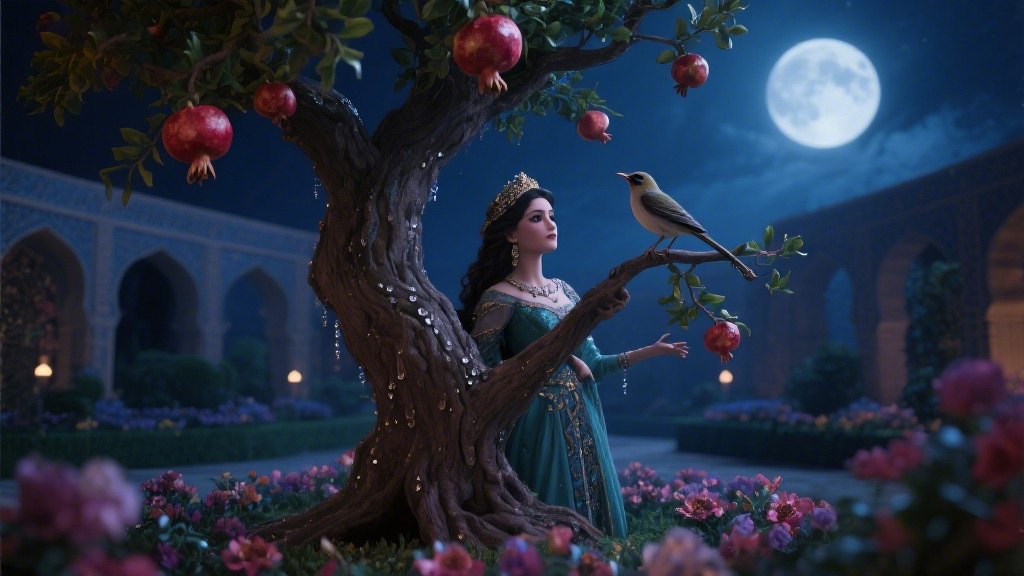+86-13516938893
Menu
global purchase

In the most glorious era of the Persian Empire, it was said that there stood a tear-shedding pomegranate tree in the king's royal garden. Whenever moonlight drenched the branches, the trunk would secrete 晶莹的 (crystal-clear) dewdrops that turned into rubies upon touching the ground. Amidst the flower bushes, a nightingale with feathers as crimson as flames sang through the night, its voice holding secrets of a thousand years.
This pomegranate tree was originally transformed from a Persian princess named Soraya. She had made a covenant with the spirit of spring, vowing to protect the kingdom's garden with her own life so that it would never wither. When she transformed into the pomegranate tree on a moonlit night, the spirit infused a drop of starlight tear into the trunk: "As long as the nightingale's song never ceases, your fruits will remain sweet forever."
The nightingale, originally named Shaman, was the princess's personal maid. Unwilling to part from her mistress, she prayed to the gods to stay by the pomegranate tree forever. Moved by her loyalty, the gods turned her into a nightingale, granting her eternal life but also laying a curse: if she stopped singing, the pomegranate tree would wither, and the garden would fall into eternal winter.
For three hundred years, Shaman never ceased singing. She watched the pomegranate tree bloom with pale red flowers in spring and bear plump fruits in autumn; she witnessed kings come and go, and saw the garden fountains flow like rivers of time. Until one year, a merchant traveler from afar brought a plague. Flowers in the kingdom began to wither, people fell gravely ill, and even the king took to his bed.
Shaman's song grew hoarse, yet she sang day and night without rest. Blood oozed from her throat, staining the dewdrops on the pomegranate tree's leaves. Miraculously, when these blood-stained dewdrops fell on withered petals, the flowers bloomed again; when dripped into well water, the sick who drank it gradually recovered.
When the plague finally subsided, Shaman's feathers had lost their luster, and her voice grew faint. She perched on the pomegranate tree's branch, watching the trunk—Soraya's transformed form—sway gently, as if caressing her feathers. At that moment, the spirit of spring reappeared, holding a crystal vial filled with morning dew: "Your guardianship and loyalty have moved heaven and earth. From now on, the nightingale shall no longer be bound to sing ceaselessly, and the pomegranate tree shall remain evergreen."
The spirit sprinkled the morning dew on the nightingale. Shaman instantly regained her human form, while the pomegranate tree's branches suddenly bloomed with unprecedented two-colored flowers—half pomegranate red, half the crimson of the nightingale's feathers. From then on, these magical flowers bloomed perpetually in Persian gardens, known as "Soraya's Flowers."
Every spring, the song of the nightingale echoes in Persian gardens, but no longer as endless overnight chirping, but as melodious melodies harmonizing with blooming flowers and falling leaves. People say that on moonlit nights, if you sneak into the garden quietly, you may see a red-clothed woman embracing a maid under the pomegranate tree. Moonlight shines upon them, turning into fluttering petals and starlight.
This story has been passed down in Persian poetry for a thousand years. People use pomegranates to symbolize eternal life and nightingales to represent unwavering loyalty. Even today, patterns of pomegranate trees and nightingales can be seen everywhere in Iranian gardens. Elders tell children: true guardianship is never about sacrifice, but willing companionship—just like the pomegranate and nightingale, nurturing each other through time and remaining inseparable through the years.